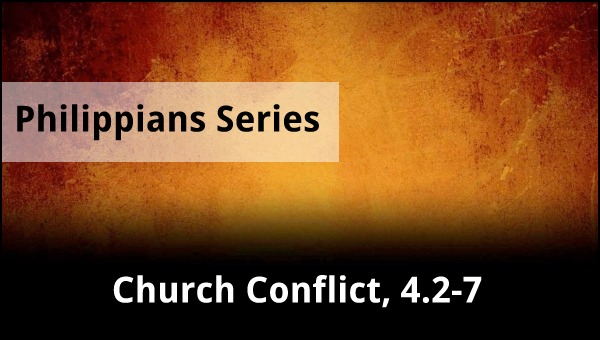By Tyson Thorne

I appeal to Euodia and to Syntyche to agree in the Lord. 4:3 Yes, I say also to you, true companion, help them. They have struggled together in the gospel ministry along with me and Clement and my other coworkers, whose names are in the book of life. 4:4 Rejoice in the Lord always. Again I say, rejoice! 4:5 Let everyone see your gentleness. The Lord is near! 4:6 Do not be anxious about anything. Instead, in every situation, through prayer and petition with thanksgiving, tell your requests to God. 4:7 And the peace of God that surpasses all understanding will guard your hearts and minds in Christ Jesus.
Sometimes it happens, even among believers. Arguments arise and fellowship can be broken. There was a situation just like this among a pair of believers at the church in Philippi. We don’t know the nature of the argument, but if Paul had heard about it while in prison it had to be a doozy. The two Greek immigrants (we know their nationality based on their names, and since Philippi was a Roman city they were likely legal immigrants) could not work out their problem together, so Paul asked the church to help them. At least that’s one reading.
It could also be that the word translated “true companion” is a proper name, Suzugos. Either way, counsel was needed and Paul expected the believers to assist. What made resolution especially important in this case is the dispute is among ministers, people who should know how to handle conflict. Paul describes them as coworkers, and it is possible that this relationship goes all the way back to Acts 16, where another Greek merchant named Lydia had a prayer group that Paul stumbled upon. While this may be pure conjecture on my part, it would explain the relationship between them and Paul; it also ties the them to the Greek community in Philippi. Since Euodia and to Syntyche are female names it isn’t such a stretch that they were part of Lydia’s prayer group. So while the evidence is circumstantial, I think it ties together rather well.
In American culture, people not involved in a disagreement standing in to assist might be viewed as sticking their nose in where it doesn’t belong and may embarrass the people who are feuding. In fact, for a variety of reasons, adversity is largely ignored. If people don’t work out their problems on their own, however, an improper division often results which weakens the church. This is one time when the rugged individualism of American culture is a liability rather than an asset. In many other cultures around the globe friends and family often pitch in to help resolve conflict before it becomes destructive, and this is also indicative of Kingdom culture.
Jesus teaches the same principle in Matthew 18.15-17:
“If your brother sins, go and show him his fault when the two of you are alone. If he listens to you, you have regained your brother. But if he does not listen, take one or two others with you, so that at the testimony of two or three witnesses every matter may be established. If he refuses to listen to them, tell it to the church.”
The people of a church are supposed to be involved in each other’s lives, to the benefit of all.
Paul rarely issues commands like this without telling us how to go about it, and this passage is no different. He comes back around to his command to rejoice, for even conflict promotes spiritual growth. Before we get involved in someone else’s conflict, however, we need to check our mental and emotional state. We should enter into such matters with gentleness and peace. If we rush in and take sides immediately and share in the anxiousness we will not resolve the issue in a God-honoring fashion. We ought to pray with those who are arguing, together, asking God for wisdom and love with a thankful heart. Handling conflict in this manner will result in a peaceful resolution that, instead of being destructive, guards the church.
Paul has emphasized throughout this letter that we are all citizens of Heaven, probably because citizenship was so important to the people of Philippi. We are also part of a family, however, one where God is our father and where it is always appropriate to intercede when conflict arises. Church conflict is family conflict, and it’s time we started behaving like it.
|
|
